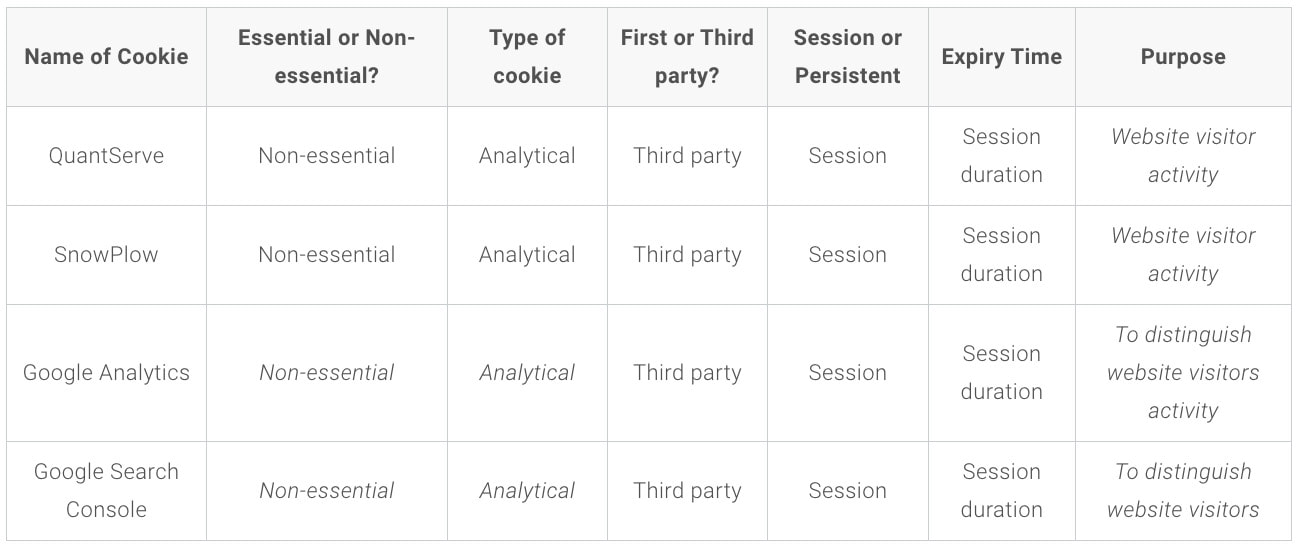Cookies Policy
This Cookies Policy sets out the basis on which we, Creative Remedy use cookies and similar technologies on or in relation to our website, www.creativeremedy.co.uk. This Cookies Policy is effective from 1st July 2020.
‘Essential’ cookies are automatically placed on your computer or device when you access our website or take certain actions on our website. Non-essential’ cookies and other technologies are only placed on your computer or device if you have consented to us doing so. For information on the difference between essential and non-essential cookies, see the section below entitled About cookies.
For information on how you consent and how you can withdraw your consent to us placing non-essential cookies and other technologies on your computer or device, see the section below entitled How to accept or reject cookies.
‘Essential’ cookies are automatically placed on your computer or device when you access our website or take certain actions on our website. Non-essential’ cookies and other technologies are only placed on your computer or device if you have consented to us doing so. For information on the difference between essential and non-essential cookies, see the section below entitled About cookies.
For information on how you consent and how you can withdraw your consent to us placing non-essential cookies and other technologies on your computer or device, see the section below entitled How to accept or reject cookies.
Contents
- About cookies
- List of cookies used
- Essential cookies
- Non-essential cookies
- How to accept or reject cookies
- Copyright, credit and logo
About cookies
What are cookies?
Cookies are small data files sent by a website’s server to a web browser, processor memory or hard drive and stored there. They can be used for a range of different purposes, such as customising a website for a particular user helping a user navigate a website, improving that user’s website experience, and storing that user’s preferences and login information.
Essential and non-essential cookies
Cookies can be classified as either ‘essential’ or ‘non-essential’.
Essential cookies: these are cookies that are either:
Session and persistent cookies
Cookies can be classified as either ‘session’ or ‘persistent’, depending on how long they last after they are placed on your browser.
Session cookies: session cookies last for as long as you keep your browser open. They expire when you close your browser.
Persistent cookies: persistent cookies expire at a fixed point in time or if you manually delete them from your browser, whichever occurs first.
First and third party cookies
Cookies can be classified as ‘first party’ or ‘third party’.
First party cookies: these are cookies placed on your device by our website domain.
Third party cookies: these are cookies placed on your device by third party website domains.
If you require further information about cookies in general, please visit www.allaboutcookies.org
Cookies are small data files sent by a website’s server to a web browser, processor memory or hard drive and stored there. They can be used for a range of different purposes, such as customising a website for a particular user helping a user navigate a website, improving that user’s website experience, and storing that user’s preferences and login information.
Essential and non-essential cookies
Cookies can be classified as either ‘essential’ or ‘non-essential’.
Essential cookies: these are cookies that are either:
- used solely to carry out or facilitate the transmission of communications over a network; or
- strictly necessary to provide an online service (e.g. our website or a service on our website) which you have requested.
Session and persistent cookies
Cookies can be classified as either ‘session’ or ‘persistent’, depending on how long they last after they are placed on your browser.
Session cookies: session cookies last for as long as you keep your browser open. They expire when you close your browser.
Persistent cookies: persistent cookies expire at a fixed point in time or if you manually delete them from your browser, whichever occurs first.
First and third party cookies
Cookies can be classified as ‘first party’ or ‘third party’.
First party cookies: these are cookies placed on your device by our website domain.
Third party cookies: these are cookies placed on your device by third party website domains.
If you require further information about cookies in general, please visit www.allaboutcookies.org
List of cookies used
We use the following cookies on or in relation to our website:
Essential cookies
These are cookies which are strictly necessary for our website to be able to operate or to provide you with a service on our website which you have requested. We use the following essential cookies on our website:
Legitimate interests: ensuring our site functions properly and providing you with online services you have requested.
How to opt out of essential cookies
Most browsers allow you to block all cookies, including essential cookies. Please note, however, that if you block all cookies, parts of our website and its functionality may not work or display properly.
You can delete existing cookies from your browser by clearing your browsing data and ensuring that the option to delete cookies is selected.
For more detailed information on how to accept and reject cookies, including guidance for specific browsers, please see the section below entitled How to accept or reject cookies
- Third party session cookies to recognise whether you have accepted the use of cookies on our website. These cookies are: QuantServe and SnowPlow. These cookies expire after your session duration.
- Third party session cookies to track user activity such as page visits, page visit length and your journey to a specific website page These cookies are: Google Analytics and Google Search Console These cookies expire after the session duration.
Legitimate interests: ensuring our site functions properly and providing you with online services you have requested.
How to opt out of essential cookies
Most browsers allow you to block all cookies, including essential cookies. Please note, however, that if you block all cookies, parts of our website and its functionality may not work or display properly.
You can delete existing cookies from your browser by clearing your browsing data and ensuring that the option to delete cookies is selected.
For more detailed information on how to accept and reject cookies, including guidance for specific browsers, please see the section below entitled How to accept or reject cookies
Non-essential cookies
We use the following types of non-essential cookies on our website:
Processing information about you contained in or obtained from functional cookies
Legitimate interests: improving your website experience and providing or enhancing the website functionality you have requested.For further information on how we use the information gathered from our use of functional cookies, please see the section entitled Our use of automated decision making and profiling in our privacy policy, which is available here: Privacy Policy
Analytical (or performance) cookies
Analytical (or performance) cookies track and gather data about what a user does on a website. These cookies are not essential for our website or its functionality to work. We use the following analytical cookies on our website:
We use Google Analytics cookies on our website. Google Analytics cookies help us understand how you engage and interact with our website, including how you came to our website, which pages you visited, for how long and what you clicked on, your location (based on your IP address)
The Google Analytics cookies used on our website are: ga, gid, AMP_TOKEN and _gac_ <property-id> These cookies are session cookies. These cookies expire after a users session when they leave the Creative Remedy website.
The information we collect using analytical cookies is collected on an anonymised basis.
More information
Google Analytics cookies are classified as first party cookies as they are set by our website domain, although Google collects and processes information from our use of Google Analytics. To find out more about how Google handles information collected from Google Analytics, see Google Analytics’ privacy policy, which is available here: Google Analytics Privacy Policy
For information on how Google uses data from cookies it uses, please visit Google Privacy Policy
How to opt in or out from analytical cookies
See the section below entitled How to accept or reject cookies
To opt out of Google Analytics tracking across all websites in general, you can do so here: Google Analytics Opt Out
Processing information about you contained in or obtained from analytical cookies
Legal basis for processing: we process information about you contained in or obtained from analytical cookies in our legitimate interests (Article 6(1)(f) of the General Data Protection Regulation).
Legitimate interests: analysing how individuals use our website to help us improve our website and business. For further information on how we use the information gathered from our use of analytical cookies, including profiling, please see the section entitled Our use of automated decision making and profiling in our privacy policy, which is available here: Privacy Policy
How to opt in or out from advertising cookies
See the section below entitled How to accept or reject cookies
Third party cookies
Third parties use cookies to analyse your use of our website and/or to display advertisements (including third party advertisements) to you e.g. advertisement conversion tracking such as Google AdWords. Third party cookies used in relation to our website can include:
More information
For information about the cookies Google uses in relation to the above, see the ‘Advertising’ section on the Types of cookies used by Google page in Google’s cookies policy, which is available here: Google Cookie Policy
For information about how Google uses data from cookies for its own purposes, please visit the following link Google Privacy Policy
How to opt in or out from third party cookies
See the section below entitled How to accept or reject cookies
Processing information about you contained in or obtained from third party cookies
Legal basis for processing: we process information about you contained in or obtained from third party cookies in our legitimate interests (Article 6(1)(f) of the General Data Protection Regulation).
- Functional cookies
- Analytical (or performance) cookies
- Targeting (or advertising) cookies
Processing information about you contained in or obtained from functional cookies
Legitimate interests: improving your website experience and providing or enhancing the website functionality you have requested.For further information on how we use the information gathered from our use of functional cookies, please see the section entitled Our use of automated decision making and profiling in our privacy policy, which is available here: Privacy Policy
Analytical (or performance) cookies
Analytical (or performance) cookies track and gather data about what a user does on a website. These cookies are not essential for our website or its functionality to work. We use the following analytical cookies on our website:
We use Google Analytics cookies on our website. Google Analytics cookies help us understand how you engage and interact with our website, including how you came to our website, which pages you visited, for how long and what you clicked on, your location (based on your IP address)
The Google Analytics cookies used on our website are: ga, gid, AMP_TOKEN and _gac_ <property-id> These cookies are session cookies. These cookies expire after a users session when they leave the Creative Remedy website.
The information we collect using analytical cookies is collected on an anonymised basis.
More information
Google Analytics cookies are classified as first party cookies as they are set by our website domain, although Google collects and processes information from our use of Google Analytics. To find out more about how Google handles information collected from Google Analytics, see Google Analytics’ privacy policy, which is available here: Google Analytics Privacy Policy
For information on how Google uses data from cookies it uses, please visit Google Privacy Policy
How to opt in or out from analytical cookies
See the section below entitled How to accept or reject cookies
To opt out of Google Analytics tracking across all websites in general, you can do so here: Google Analytics Opt Out
Processing information about you contained in or obtained from analytical cookies
Legal basis for processing: we process information about you contained in or obtained from analytical cookies in our legitimate interests (Article 6(1)(f) of the General Data Protection Regulation).
Legitimate interests: analysing how individuals use our website to help us improve our website and business. For further information on how we use the information gathered from our use of analytical cookies, including profiling, please see the section entitled Our use of automated decision making and profiling in our privacy policy, which is available here: Privacy Policy
How to opt in or out from advertising cookies
See the section below entitled How to accept or reject cookies
Third party cookies
Third parties use cookies to analyse your use of our website and/or to display advertisements (including third party advertisements) to you e.g. advertisement conversion tracking such as Google AdWords. Third party cookies used in relation to our website can include:
- Google AdWords cookies to track whether you have come to us via an advertisement we have placed on a search engine results page and/or elsewhere across the internet, such as another website and to record information relating to how you came to us such as your location when you accessed our website, the time of day you visited and the device you were using by AdWords tracking or conversion cookies. Google may use different cookies to track how you came to our website depending on what advertisement you clicked on and where.
More information
For information about the cookies Google uses in relation to the above, see the ‘Advertising’ section on the Types of cookies used by Google page in Google’s cookies policy, which is available here: Google Cookie Policy
For information about how Google uses data from cookies for its own purposes, please visit the following link Google Privacy Policy
How to opt in or out from third party cookies
See the section below entitled How to accept or reject cookies
Processing information about you contained in or obtained from third party cookies
Legal basis for processing: we process information about you contained in or obtained from third party cookies in our legitimate interests (Article 6(1)(f) of the General Data Protection Regulation).
Other technologies
Web beacons
We and any marketing companies we use also embed web beacons in our marketing emails and/or on our website. Web beacons are small GIF image files which enable us to track your receipt of our marketing emails, how often you view our adverts or website pages, your location, IP address and browser information. Web beacons are activated whenever you open a marketing email or access a page on our website which contains a web beacon. Web beacons transmit data when you view them but are not capable of accessing any other information on your computer. Web beacons are not stored on your hard drive unless you download a GIF image containing them.
Some (but not all) browsers enable you to restrict the use of web beacons by either preventing them from sending information back to their source (for example, when you choose browser settings that block cookies and trackers), or by not accessing the images containing them (for example, if you select a ‘do not display images in emails setting in your email server).
How to opt in or out
See the section below entitled How to accept or reject cookies
Legal basis for processing: we process the information we gather from the use of web beacons in our legitimate interests (Article 6(1)(f) of the General Data Protection Regulation).
Legitimate interest: we analyse the effectiveness of our email marketing campaigns. For further information on how we use the information gathered from our use of web beacons[, including automated decision making and profiling please see the section entitled Our use of automated decision making and profiling in our privacy policy, which is available here: Privacy Policy
We and any marketing companies we use also embed web beacons in our marketing emails and/or on our website. Web beacons are small GIF image files which enable us to track your receipt of our marketing emails, how often you view our adverts or website pages, your location, IP address and browser information. Web beacons are activated whenever you open a marketing email or access a page on our website which contains a web beacon. Web beacons transmit data when you view them but are not capable of accessing any other information on your computer. Web beacons are not stored on your hard drive unless you download a GIF image containing them.
Some (but not all) browsers enable you to restrict the use of web beacons by either preventing them from sending information back to their source (for example, when you choose browser settings that block cookies and trackers), or by not accessing the images containing them (for example, if you select a ‘do not display images in emails setting in your email server).
How to opt in or out
See the section below entitled How to accept or reject cookies
Legal basis for processing: we process the information we gather from the use of web beacons in our legitimate interests (Article 6(1)(f) of the General Data Protection Regulation).
Legitimate interest: we analyse the effectiveness of our email marketing campaigns. For further information on how we use the information gathered from our use of web beacons[, including automated decision making and profiling please see the section entitled Our use of automated decision making and profiling in our privacy policy, which is available here: Privacy Policy
How to accept or reject cookies
There are a number of different ways in which you can accept or reject some or all cookies and web beacons. Some of the main methods of doing so are described below:
You are welcome to block the use of some or all of the cookies we use on our website. However, please be aware that doing so may impair our website and its functionality or may even render some or all of it unusable.
You should also be aware that clearing all cookies from your browser will also delete any cookies that are storing your preferences, for example, whether you have accepted cookies on a website or any cookies that are blocking other cookies.
You can find more detailed information about cookies and adjusting your browser settings by visiting www.allaboutcookies.org
Accepting or rejecting cookies
Cookie control tool
You can accept or reject non-essential cookies by using our cookie management tool at the footer of our website. We advise you not to click ‘accept’ if you don’t want cookies to be used in your session.
Browser settings
You can accept or reject some or all cookies (for example, blocking all third party cookies) by adjusting your browser settings. If you do not know how to do this, the links below set out information about how to change your browser settings for some of the most commonly used web browsers: Some browsers, such as Chrome and Firefox, allow you to change your settings to browse in ‘incognito’ mode, limiting the amount of data placed on your machine and automatically deleting any persistent cookies placed on your device when you finish your browsing session. There are also many third party applications which you can add to your browser to block or manage cookies.
Existing cookies
To clear cookies that have previously been placed on your browser, you should select the option to clear your browsing history and ensure that the option to delete or clear cookies is included when you do so.
Google Ad settings
You can manage and opt out of personalisation of advertisements by Google by visiting Google’s ad settings page here Google Ad Settings and by:
Google Analytics Opt-out Browser Add-on
You can opt out of Google Analytics tracking by installing the browser add-on which is available here: Google Analytics Opt Out
Web beacons
You can opt in to us using web beacons in our marketing emails by: subscribing to our email marketing list on the home page of our website here: www.creativeremedy.co.uk
You can opt out of our use of web beacons in our marketing emails by: Clicking a link at the footer of our marketing email to unsubscribe. Or please contact us on [email protected] and ask to be removed from our mailing list.
Disconnect for Facebook
You can install a browser add-on tool called ‘Facebook Container’. This will stop Facebook tracking you on third party websites. You can install the tool here:
European Interactive Digital Advertising Alliance Tool
You can opt out of Facebook and other companies that participate in the Digital Advertising Alliance in Europe from showing you interest based ads by visiting http://www.youronlinechoices.com, selecting your country, clicking ‘Your Ad Choices’, then locating Facebook (and any other companies you want to block) and selecting the ‘Off’ option.
You are welcome to block the use of some or all of the cookies we use on our website. However, please be aware that doing so may impair our website and its functionality or may even render some or all of it unusable.
You should also be aware that clearing all cookies from your browser will also delete any cookies that are storing your preferences, for example, whether you have accepted cookies on a website or any cookies that are blocking other cookies.
You can find more detailed information about cookies and adjusting your browser settings by visiting www.allaboutcookies.org
Accepting or rejecting cookies
Cookie control tool
You can accept or reject non-essential cookies by using our cookie management tool at the footer of our website. We advise you not to click ‘accept’ if you don’t want cookies to be used in your session.
Browser settings
You can accept or reject some or all cookies (for example, blocking all third party cookies) by adjusting your browser settings. If you do not know how to do this, the links below set out information about how to change your browser settings for some of the most commonly used web browsers: Some browsers, such as Chrome and Firefox, allow you to change your settings to browse in ‘incognito’ mode, limiting the amount of data placed on your machine and automatically deleting any persistent cookies placed on your device when you finish your browsing session. There are also many third party applications which you can add to your browser to block or manage cookies.
Existing cookies
To clear cookies that have previously been placed on your browser, you should select the option to clear your browsing history and ensure that the option to delete or clear cookies is included when you do so.
Google Ad settings
You can manage and opt out of personalisation of advertisements by Google by visiting Google’s ad settings page here Google Ad Settings and by:
- unticking the button entitled ‘Also use Google Account activity and information to personalise ads on these websites and apps and store that data in your Google Account’; and
- switching the ‘Ads Personalisation’ setting off (i.e. by ensuring the switch at the top of the page is set to the left/grey and not the right/blue).
Google Analytics Opt-out Browser Add-on
You can opt out of Google Analytics tracking by installing the browser add-on which is available here: Google Analytics Opt Out
Web beacons
You can opt in to us using web beacons in our marketing emails by: subscribing to our email marketing list on the home page of our website here: www.creativeremedy.co.uk
You can opt out of our use of web beacons in our marketing emails by: Clicking a link at the footer of our marketing email to unsubscribe. Or please contact us on [email protected] and ask to be removed from our mailing list.
Disconnect for Facebook
You can install a browser add-on tool called ‘Facebook Container’. This will stop Facebook tracking you on third party websites. You can install the tool here:
European Interactive Digital Advertising Alliance Tool
You can opt out of Facebook and other companies that participate in the Digital Advertising Alliance in Europe from showing you interest based ads by visiting http://www.youronlinechoices.com, selecting your country, clicking ‘Your Ad Choices’, then locating Facebook (and any other companies you want to block) and selecting the ‘Off’ option.











